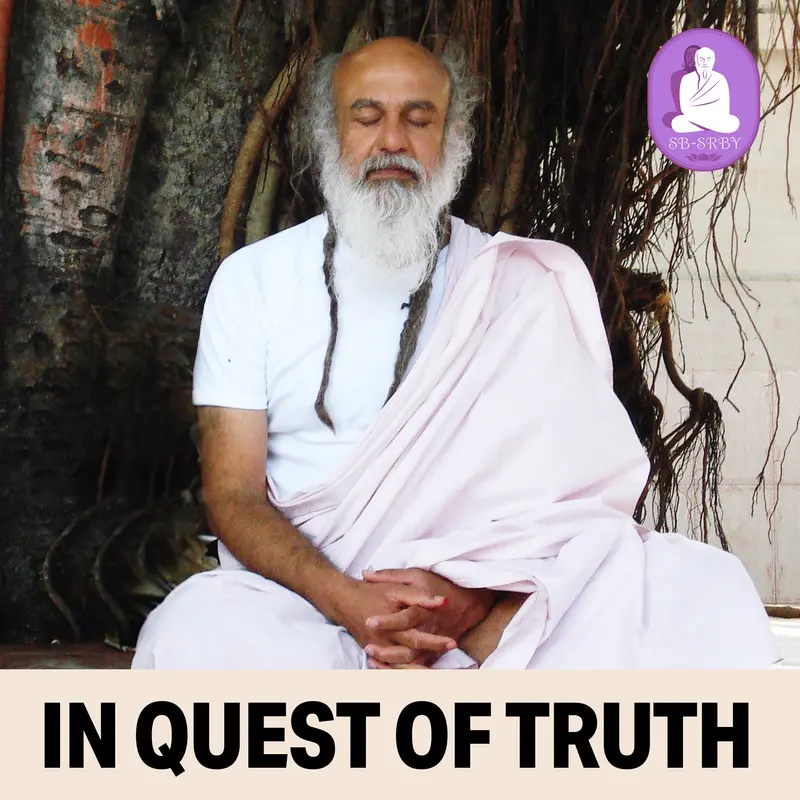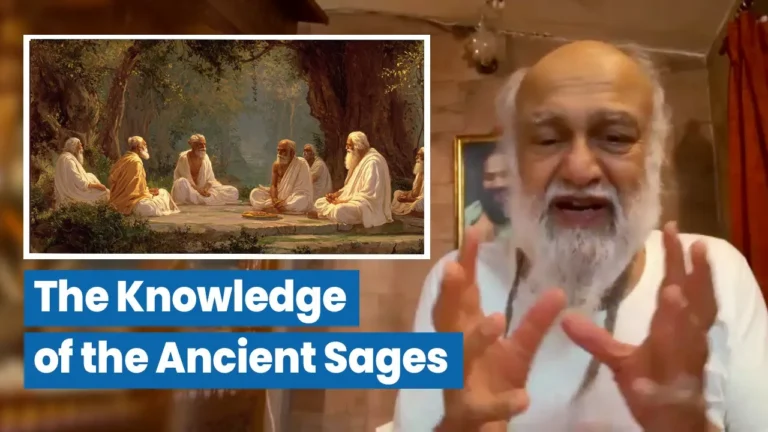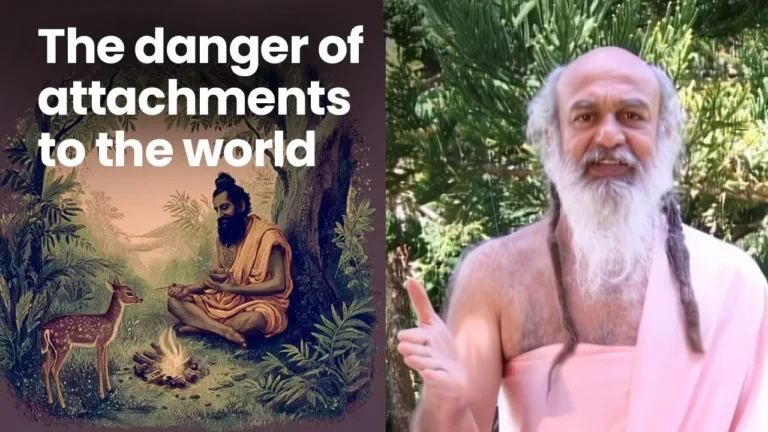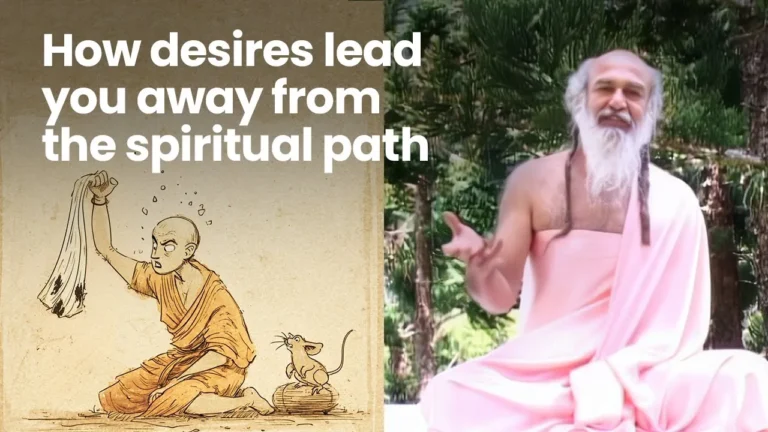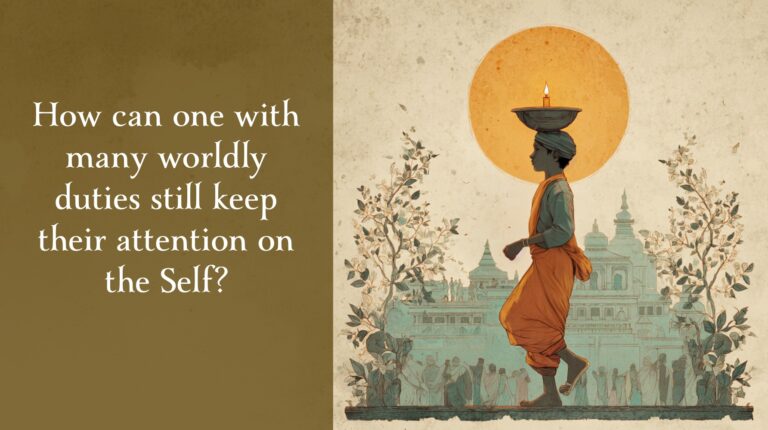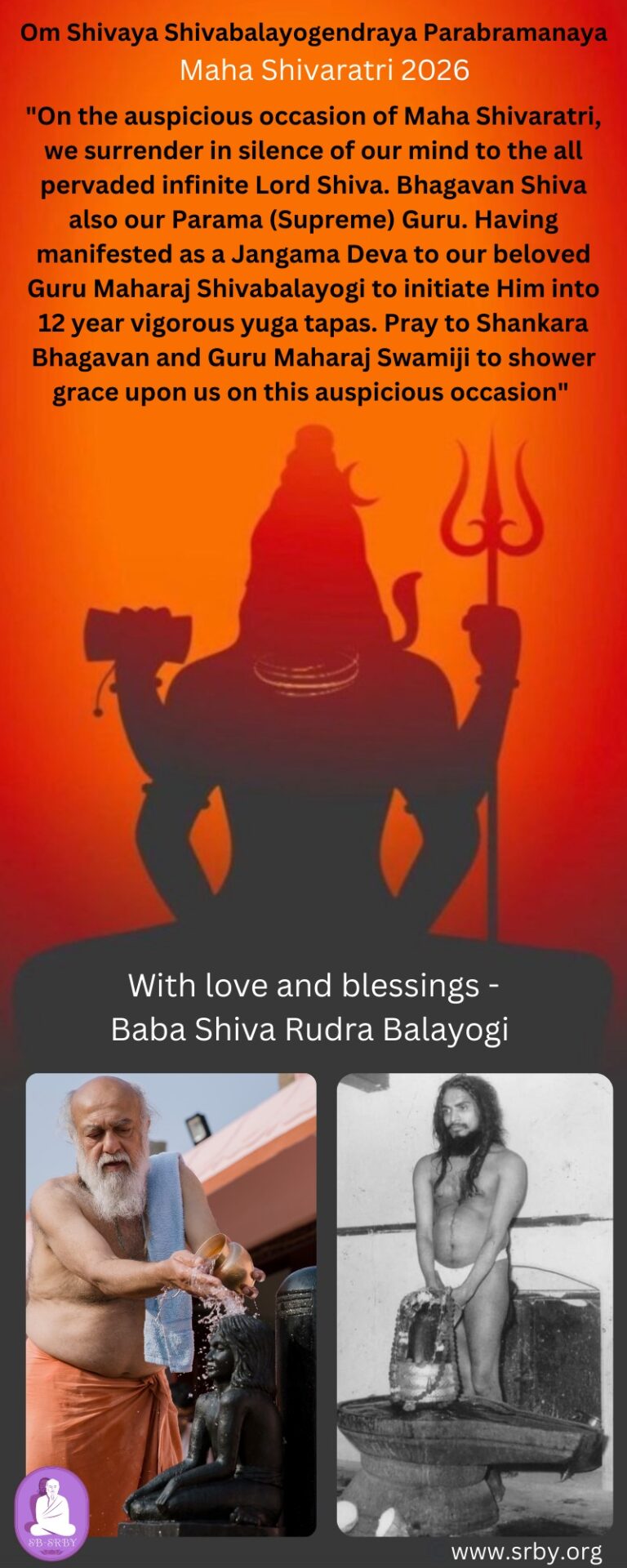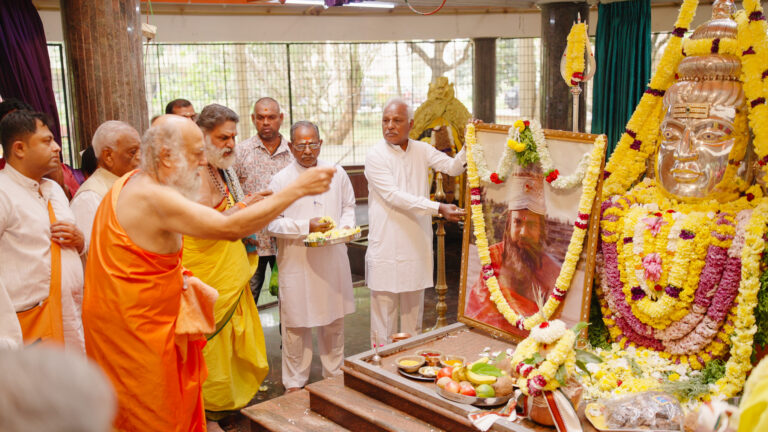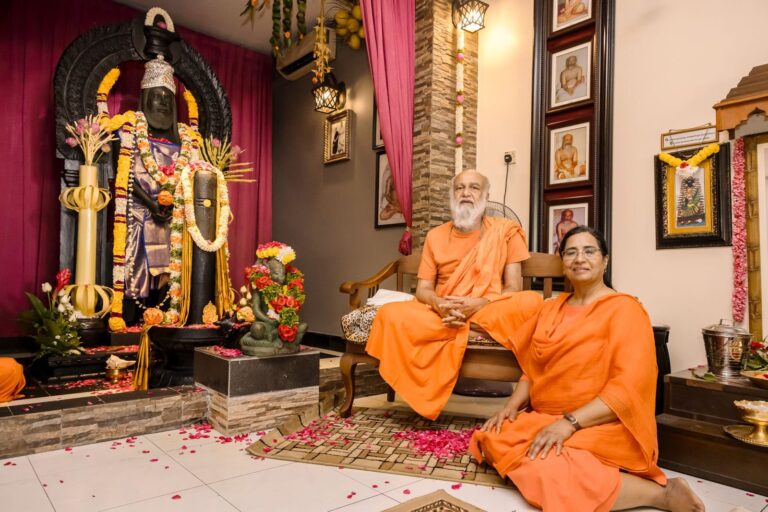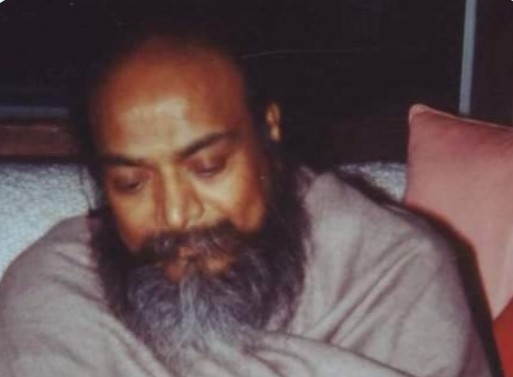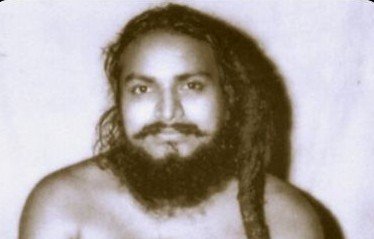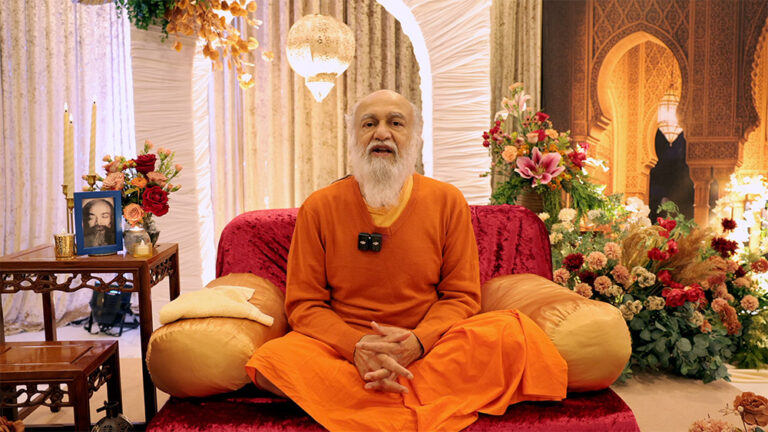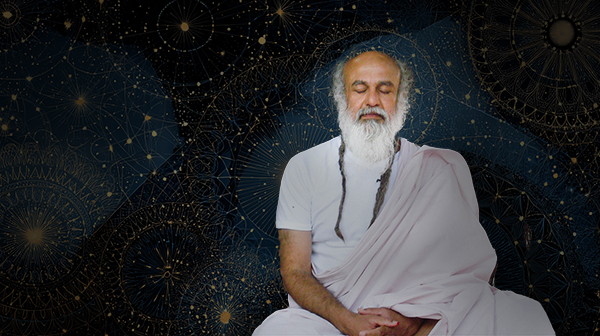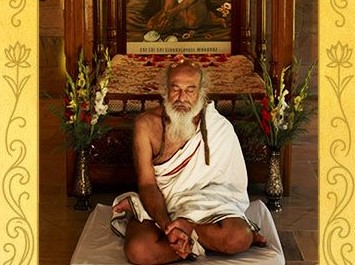Recorded on 5 May 2022 with Malaysian participants
0:00 Intro
0:16 What is prayer?
2:27 If we practice regular meditation, are we still required to perform prayer?
4:56 Is prayer to be focused on God?
6:28 If the ultimate goal is to silence the mind and realise the Self, what should our prayers be like?
8:54 What is the secret of prayer?
11:27 What is happening when one gets emotional when chanting the Divine’s name or signing devotional songs?
14:06 When we perform our worship to the altar, what is actually happening?
16:17 What is the significance of Hindu prayers such as slokas, stotrams and mantras?
21:41 Is it important to understand the meaning of the mantras or stotrams?
Discourse: Thus Spake Babaji – online Q and A No. 95
The Power of Prayer
Recorded: 05 May 2022 with Malaysian participants
Start of Questions and Answers
Question: The first question – What is prayer Babaji? Is it a request we make to God, or just thinking of God, or rituals we perform to fulfill our wishes?
Babaji Maharaj: In my opinion, a basic definition is; prayer – when you want to imagine and communicate to the Divinity applying your mind. A prayer is a request, of course. So that is the prayer. Now many people may have their own type of prayers, different, different. Whatever we want in the world, we request God to grant us, to bless us with such things. So, these are also prayers. Slowly, slowly, we need to rise to a higher level of surrendering. Applying the mind while praying also is very important. Mind’s concentration. Then your mind can go introvert, and touches the Divine, Divinity that is within, then the grace automatically flows. So when you pray, you need to be fully concentrated, that’s important. And now the highest form of prayer is leave everything to the Divine. “May it happen as you wish my Lord, but just inspire my wisdom always. And may I surrender to Your wishes that always You do the best for us.” That is the highest prayer. However, until one doesn’t get totally matured slowly and slowly, one can always pray for any worldly thing – for health, for a wealth, for happiness. So all these things, you keep praying. As you keep praying your mind also becomes purified and you get connected with the Divinity that is all pervaded
Question: Thank You Babaji. The next question. If we practice regular sadhana or meditation, are we still required to perform other forms of prayers?
Babaji Maharaj: See, always it is recommended that some other sadhanas, whenever it happens, participate so that the mind is tuned into the meditation. That is very important. Like you see, the agnihotram all you all do, that was evolved by a saint called Angirasa. Because Angirasa thought, it’s very difficult for everybody to remain in samadhi by meditating at all times, so to keep the mind engaged into Divinity this method he evolved. Yagnam, homa, homa karmas, agnihotra, what we call it, and in course of time, it has taken very different, different shapes also. Swamiji also always encouraged agnihotra and bhakti singing, bhajans, all these things also, so that the mind instead of running here and there, it stays connected to the Divine. So thus, you practice all these and also meditation regularly. So one day when you achieve Self-realization then you may not need, but to inspire others. Like you see, though Baba doesn’t need any of these things, to inspire others I participate. Even in agnihotra I participate, offer the purnahoutis whenever I am in such places, and in bhajan keertan also I participate, and sometimes I sing also as you all know; like that, just to inspire others. So it is recommended that you undertake these exercises and participate in them also, along with the meditation. Otherwise, an ego might crop up. “Oh, I’m a meditator. Now I don’t need these bhajans and keertans; I don’t need this puja. I don’t need this what you call agnihotra or any such thing.” That must not be. It will help you to lose the ego.
Question: Thank you, Babaji. I understand the significance of prayers as being focused on God. is that correct Babaji?
Babaji Maharaj: Yes, as I told earlier also, slowly your mind gets connected to the Divinity; your mind is on the Divine. And eventually it can merge also, when you totally surrender. “May it happen as you wish my Lord, but just inspire my wisdom to understand and surrender to You always. So, I know that you will always do the best for me.” So, like that, that is what, you get connected. That’s why when you pray, it’s important that your mind remains concentrated; it should not be simply running here and there and just chant with a mantra or just say with a language and loudly you say, but the mind is not there. Then such a prayer won’t reach God. The prayer will reach God when you get connected. Just like if you touch the electric wire, automatically it gives electric shock. Here also, in the mind if you touch the Divine even with an imagination, you get connected to Divine; you are addressing the Divine; you are looking at the Divine; you are remembering the Divine. Automatically when your mind becomes purified, your prayers get answered also.
Question: Thank You Babaji. The following question – if the ultimate goal is to silence the mind, and realize the Self, then what should our prayers be like, Babaji?
Babaji Maharaj: That’s what I was telling, surrender and leave everything to the Divine. May it happen as per Your wishes. So then we won’t have anything to pray; we will just surrender. So when we would have surrendered, the mind would have become quiet automatically. And that is when the mind really goes towards the Divinity. Know that whenever your mind can become quiet or is quiet, that is the real worship. And that is when your mind gets connected, goes towards the Divine only. As I have always told, the mind has no third way – either it is with its own imaginations in the world, wanting and craving, “I want this, I want that, I have to go there, I must achieve this…” Everything of the world it’s all based on imagination. So, whenever there is imagination, it is away from the Divine. If the imagination stops, then it goes towards its Divine only, automatically. It is already connected with the Divine whenever it is silent. So, that is the idea of achieving silence, then eventually a Self-Realization can happen; you can know yourself in a much better way. So that is why silencing is taught. ‘Watch’ means you are trying to silence your mind. And that is the highest prayer. When your mind becomes totally silent, that surrenders to the Divine; it becomes one with the Divine. Once you get the Divine, you don’t need anything else. You remember Swamiji always used to tell, “Even if God appears in front of you, and offers everything that He can give, say, “No need.” You want only God. Do not compromise on that. “I want God only.”” Because the happiness, the peace is in God. That is the total contentment; that’s what the Divinity is. So, whatever He gives, it’s only an appearance and disappears. So it is not going to be permanent entity at all. So it cannot give a permanent happiness. That how Swamiji used to tell.
Question: Thank You Babaji. Babaji, the satsang today says the power, significance and secret of prayers. What is the secret of prayers Babaji?
Babaji Maharaj: So, to know how to pray in the highest way is the greatest secret, first. Like I have told that the Divine wants to give you supermarket but if you ask the Divine, you will end up asking a small chocolate. So, you will go to God. You will tell, “God, give me a million dollars, I will be happy. God, give me ten ice creams. God, give me two stomachs so that I can go on eating, eating, eating all the time.” Like that, many people have their own imaginations and they will end up with such prayers. That’s what a chocolate means. You just surrender. The Divine will give you the supreme happiness. What you ask is only for ten minutes, little bit of happiness only, because you cannot imagine the Absolute as It is. Thus, you cannot imagine the highest peace also. That’s why we recommend silence your mind, surrender to the Master. When you surrender also. Like when I did karma in the Ashram – dusted, mopped, served, everything, and whatever odd works also was given, we went on doing simply with the idea, “May this service reach the Lotus feet of our beloved Master. So, may I not distinguish or discriminate or keep thinking why I should do this, why not this.” Like that, nothing; simply surrendered. So that’s when the mind became silent. Mind never went into any brooding also; it was always quiet and silent. Quietly I used to do my work, physically. Then many people thought, I am very weak, I don’t know what to talk, I don’t know what to ask Swamiji, I don’t know what to tell Him, all these things. But I knew there is nothing that we have to tell. I used to keep quiet, quietly surrendered. So, that is what is the highest secret of prayers – you become one with the Divinity that is ultimate truth. Eventually knowing yourself. That is the secret of prayers, all prayers.
Question: Thank You Babaji. Next question. Babaji, at times, chanting the Divine name or singing bhajans keeps me emotional and in tears and I do not know why this happens. Could Babaji share what this might be?
Babaji Maharaj: You see, the reason we always try to tell, any experience comes do not try to judge or bother why it is, what it is. Because Swamiji used to tell, “If I tell, suddenly an ego might crop up.” Say, tears come and you become emotional, that means your mind is better connected to the Divinity in that bhakti bhava. That is important. If you cry, you cry, simply no problem. But don’t ever try to imagine that you have become a higher type of devotee, then the surrender disappears, ego crops up. You will have to be very careful. If you become emotional, that’s fine. You become emotional when you become emotional, you must not know anything else other than the Divine. You must not think whether everybody is watching you that you are emotional, you must not think of any such thing. You must not think whether you are able to draw attention from everybody, then that is only a drama, what we call it nautanki in Hindi [laughs]. That’s what is the drama.
But if you’re really emotional and in tears, you won’t notice anybody else is there and you won’t need anybody’s certificate also; your love and your God. Your love and your Guru. That’s it. You will become one with the Guru, you become one with God. That’s what it is. If emotional, if the tears are coming up, let it come. But you don’t give up your attention to the Divine. When you are emotional, you remember God, you feel as if the God is in front of you. Like when you sing a bhajan, you imagine your Guru, your God is standing in front of you, and then become emotional watching your beloved, then you go into tears, then that bhajan comes out so beautifully in that bhava. So, that is that greatest thing of the devotion, one of the real bhava samadhi that one can go, but provided you are sincere to yourself always. And it must not be a show, to show others.
Question: Thank You Babaji. Babaji, when we perform our puja to the Divine at our altar, what is actually happening during the prayer Babaji?
Babaji Maharaj: During the prayer and when you’re offering puja, your mind has to be there. If the mind is applied in that puja through that imagination, then your mind becomes quiet and goes towards Divinity. Otherwise, it is always into imagination. And you are mechanically doing, offering some flowers and might be doing an aarathi with a camphor or an incense stick, anything might be happening. Any such a rituals, exercises. They are all exercises and is expected that along with it, that exercise, your mind also gets connected to the Divine in imagination. That’s how the bhakti marga starts.
Bhakti marga – due to imagination, mind has gone out of control and using the imagination of God only you try to bring it single pointed. When it becomes single-pointed then it goes towards the Divine. That is the highest form of worship – when your mind is also there. So, I have always told, God has not demanded whether He wants camphor, gold, or silver or water or milk. Even on a shiva lingam if you just pour a glass of water is enough. So, that is a ritual. A ritual is an exercise. With that exercise your mind has to be there. That’s what God demands. You might be pouring water – God demands that the mind be there. You might be pouring milk – that doesn’t give an extra certificate, “Oh, this man is pouring milk, he doesn’t have to keep his mind. Oh, so you can go to a shopping complex in the mind.” No such concessions or discounts in this. One rule: your mind must be there. So that is what is happening or has to happen.
Question: Thank You, Babaji. This is the last question I have for You, Babaji. Babaji, could You please share with us the types of Hindu prayers such as stotras, shlokas, mantras and what are their significance?
Babaji Maharaj: They are all the chants. In ancient times, long, long ago, some sages have compiled the prayers in Sanskrit language. Some of them – if it is a smaller one, it’s known as shlokas and they are chants also, longer ones or prayers are also there. The stotras is actually stotram – that’s what the pronunciation is. Stotram is – you chant in praise of the Divine. Always, usually in all these chants, the Divine’s qualities are praised; ‘You are all pervaded, You are this, You are that,’ like that. Like a Rudri Pathum is there, chant is there, Saundarya Lahiri is there, Chandi Path is there. Like that so many things have been composed. All these have been according to grammar wise, they have been compiled. If it is a longer one, stotram; if it’s small, shlokas; and the big chant and like Chaalisa or the Ashtotram. Ashtotram is the 108 names. Belonging to this, it has been named like this one. Sahasranaamaavali, Sahasrashati, Saptashati, so many names are all there in Vedas, there is no end. So, anything you can practice; you can select whichever appeals to you. But one important thing if you remember, it is the mind. So when you chant, you can chant. In your own language you can chant, you can chant in Tamil, you can chant in Malay, you can chant in anyway or you can chant in the Sanskrit shloka that has been told. Like that you can learn anything, one or two or so many things. Like Hanuman Chaalisa is done in that Ayodhya language by Tulsidas, he has composed in such a way. So, some stotrams – Adi Shankaracharya has composed in Sanskrit language also. Like Bhaja Govindam was composed in Sanskrit language. Some songs also have been sung. Some great musicians, poets – they were great Self-Realized souls. They have composed in different languages. Like in southern part of India, Trinities; they were the most well-known – Muthuswami Dikshitar, Shyama Dikshitar, and Thyagaraja. Thyagaraja composed songs in Telugu. They are known as keertans, and different, different, names according to the quality or the length or the thing that is composed. And Muthuswami Dikshitar composed in Sanskrit language, like that. Adi Shankaracharya, composed in Sanskrit language, so many stotrams. Sometimes I have been singing like Na Cha Vyoma Bhumir Na Tejo Na Vayuh you have heard me singing also. It was composed by Adi Shankaracharya in Sanskrit, telling, ‘I am not the void place, I am not this earth, I am not this, that, but I am that Supreme Consciousness, Shivoham (Shiva Aham).’ ‘I am that,’ that means. That Shiva – Shiva means your existence in total thoughtlessness state, when your mind becomes totally silent. So then, mind appears to be inert but it is not inert. If you keep watching at that time in meditation, when all thoughts and visions get cleared, you will see existence consciousness.
Your consciousness of existence is always there, means that infinity, that is what is known as the soul, that is eternal – that is what Shiva is. Shiva means, which is all pervaded Supreme Consciousness of existence. that’s what Adi Shankara tells, “I am that, Shivoham. That Shiva is that I, I am not this body.” Like that, He has composed in Sanskrit. So many things we have sung. Bhaja Govindam we sing; and other songs also – Samba Sada Shiva, all these are some; and some are other local languages also. Many people in Malaysia, so many people they have composed on Babaji and Swamiji and sang that as Tamil songs also. Like that. So, it is in all type of languages. Stotrams, bhajans, keertans, singing of all these things, chants; a shloka is chanted, so it becomes to be known as a chant and a keertan is sung, so it becomes to be known as a song. Like that. So all the time, one rule; ‘apply the mind’.
Question: Babaji, is it important for us to understand the meaning of the mantra or slokas?
Babaji Maharaj: All the time it is not necessary in bhakti marga. Though if you understand the meaning you might be able to enjoy when it is sung in praise after Divine, but however, in bhakti marga… remember my story I told about Kanakadasa. When Kanakadasa was a shepherd boy, he used to go out every day taking his sheep and cows also. So then one day he saw some priests doing some worship, and they were chanting mantras also. So then, this boy went and was hiding himself out of fear behind a tree, that they might ridicule him that he was an untouchable boy. But at the end of the puja, he mustered some courage and requested one priest, “Please teach me this worship. This is so interesting. The chants are so nice. So I also would like to worship God like this.” So then that priest ridicules and makes fun of him, “You are a cowherd boy. What you know about these mantras. You are not at all learned and you cannot understand this thing. However, you do one thing go and sit under the tree. Keep chanting ‘buffalo, buffalo, buffalo, buffalo, buffalo’, you are a buffalo boy.” But that boy was so innocent. His heart was so pure. He just took it in good faith, went and sat under the tree and started chanting “Buffalo, buffalo, buffalo.” ‘Kona’ is the word in Kannada. In that language it comes. Kona means buffalo. That’s what. Then he chants. Then the story says Lord Yama appeared in front of him and initiated him into the mantra of Keshava, the Lord Krishna’s name. Kaginele aadhi Keshava – In the Kaginele is a town where a beautiful temple for Keshav, that name is there, so He initiated and guided him to go to another great Self-Realized soul Vyaasateertha where he went and learned more about the Self-Realization. Eventually he became Self-Realized. It was his total faith.
So, here finally what you have to understand, your faith is more important than the meaning itself. That’s the music, simply a sound effect. So it can be a good therapy for your mind to become quiet, single-pointed, even though you don’t know the language. So you all enjoy a music, any filmy music of any language whether it is Hindi, Tamil, Kannada, you don’t bother, right? You enjoy simply that dance and the sound effect that’s going; like that. Here also the Divine things also – when you have that faith; ‘this is the Divinity, you must believe that, have total faith’, so then it works for you. So, however, if it’s possible to know the meaning, that might be enjoyable also, “O this is God, O this is the Divinity.” Some people, those great people who were Self-Realized, they were also composers, musicians, they were poets, they could compose in such beautiful languages.
End of Session

